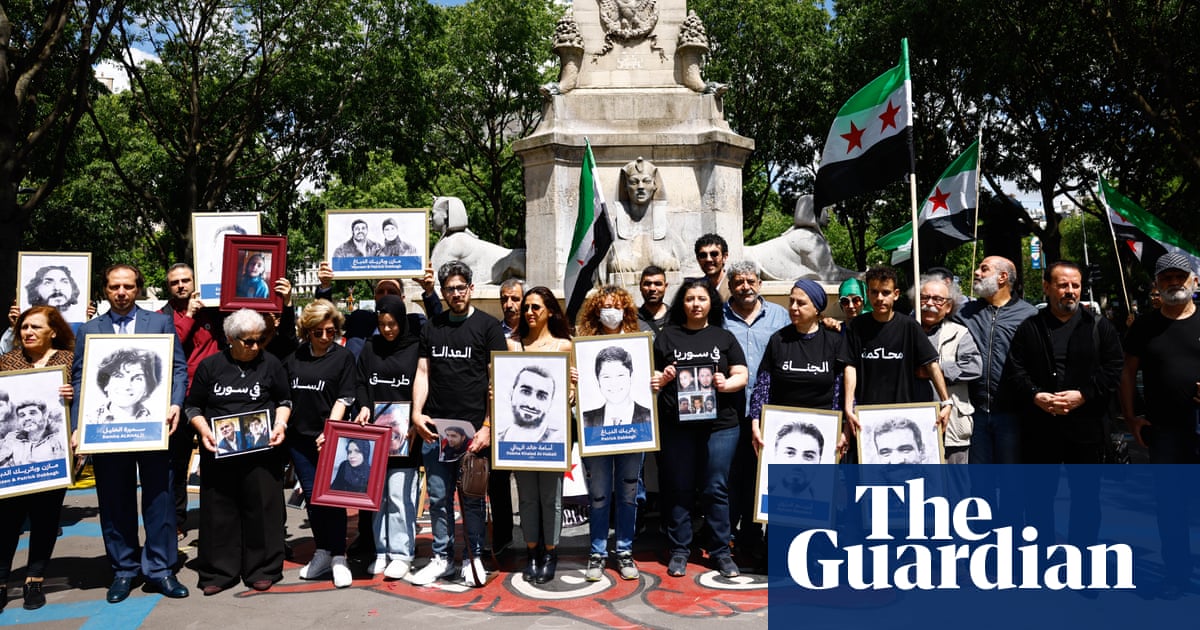A French court has found three Syrian officials of the regime of Bashar al-Assad guilty of crimes against humanity and war crimes, sentencing them in absentia to life imprisonment on Friday after a landmark trial in Paris.
The verdicts against Ali Mamlouk, head of the Syrian secret services and security adviser to Assad, Jamil Hassan, who was head of the Syrian air force intelligence unit until 2019 and a member of Assad’s entourage, and Abdel Salam Mahmoud, intelligence director at the notorious Mezzeh detention centre, send a strong message about the long arm of international justice.
The judges ordered that international arrest warrants against the three officials should remain in force. The verdict gives some hope of justice for the families of thousands of Syrians believed to have been tortured to death by intelligence officials working for the Damascus regime.
Mamlouk, 78, Hassan, 72, and Mahmoud, who is in his early 60s, were charged with complicity in the arrest, torture and death of student Patrick Dabbagh, 20, and his father, Mazzen, 48, both Franco-Syrians.
Patrick Dabbagh was in the second year of an arts and humanities degree at the University of Damascus when he was arrested at his home in November 2013. His father, Mazzen, 48, who worked as a senior education adviser at the French Lycée in Damascus, was arrested the following day.
Witnesses said that father and son were taken to the detention centre at Mezzeh military airport run by the Syrian air force intelligence service, where prisoners have been subjected to appalling torture.
In 2018, the family was informed that both had died, but not given any cause of death or allowed to recover the bodies.
Before the trial, judges from France’s special war crimes tribunal, who spent seven years investigating the case, said it was “sufficiently established” that the two men “like thousands of detainees of the air force intelligence, suffered torture of such intensity that they died”.
The public prosecutor told the court the events surrounding the disappearance and deaths of the father and son were “part of a context in which tens, if not hundreds, of thousands of Syrians can identify”. She accused Assad’s regime of conducting “a repressive state policy, implemented by the highest levels” of the hierarchy. The defendants, like Assad, were “the architects of this system”, she added.
In her summing-up, Clémence Bectarte, lawyer for the Dabbagh family and the International Federation for Human Rights (FIDH), said: “These are not crimes of the past … At least two of the three accused in the disappearance and death of Patrick and Mazzen Dabbagh are still in high post in the Syrian state apparatus.”
During the four-day trial, the court heard from witnesses how children, some believed to be as young as 10, and older prisoners were tortured at the Mezzeh centre.
The case, brought to France’s special war crimes tribunal by FIDH, the Human Rights League of France and the Syrian Center for Media and Freedom of Expression, highlights the determination of European states to prosecute crimes against humanity, war crimes and genocide under the principle of universal jurisdiction. This allows nations to try perpetrators regardless of their nationality or where the crimes were committed.
Trials of Syrians have taken place in the Netherlands, Germany and Sweden, but the French trial is the first time such high-ranking figures close to Assad have been held to account.
The Syrian conflict began with pro-democracy protests in 2011 and escalated into civil war, with a mass uprising against Assad the following year.
More than 15,000 Syrians are believed to have been tortured to death by intelligence officials. More than 230,000 civilians, including 30,000 children, are reported to have been killed in the conflict, according to the Syrian Network for Human Rights.
Assad has been rehabilitated in the Arab world over the past 12 months, invited to Arab League summits and meetings with other regional leaders.
In November last year, France issued an international arrest warrant for Assad for the use of chemical weapons against civilians. Three others, including Assad’s brother, Maher, were also indicted over the use of sarin gas in two 2013 attacks that killed more than 1,000 people, including hundreds of children.

